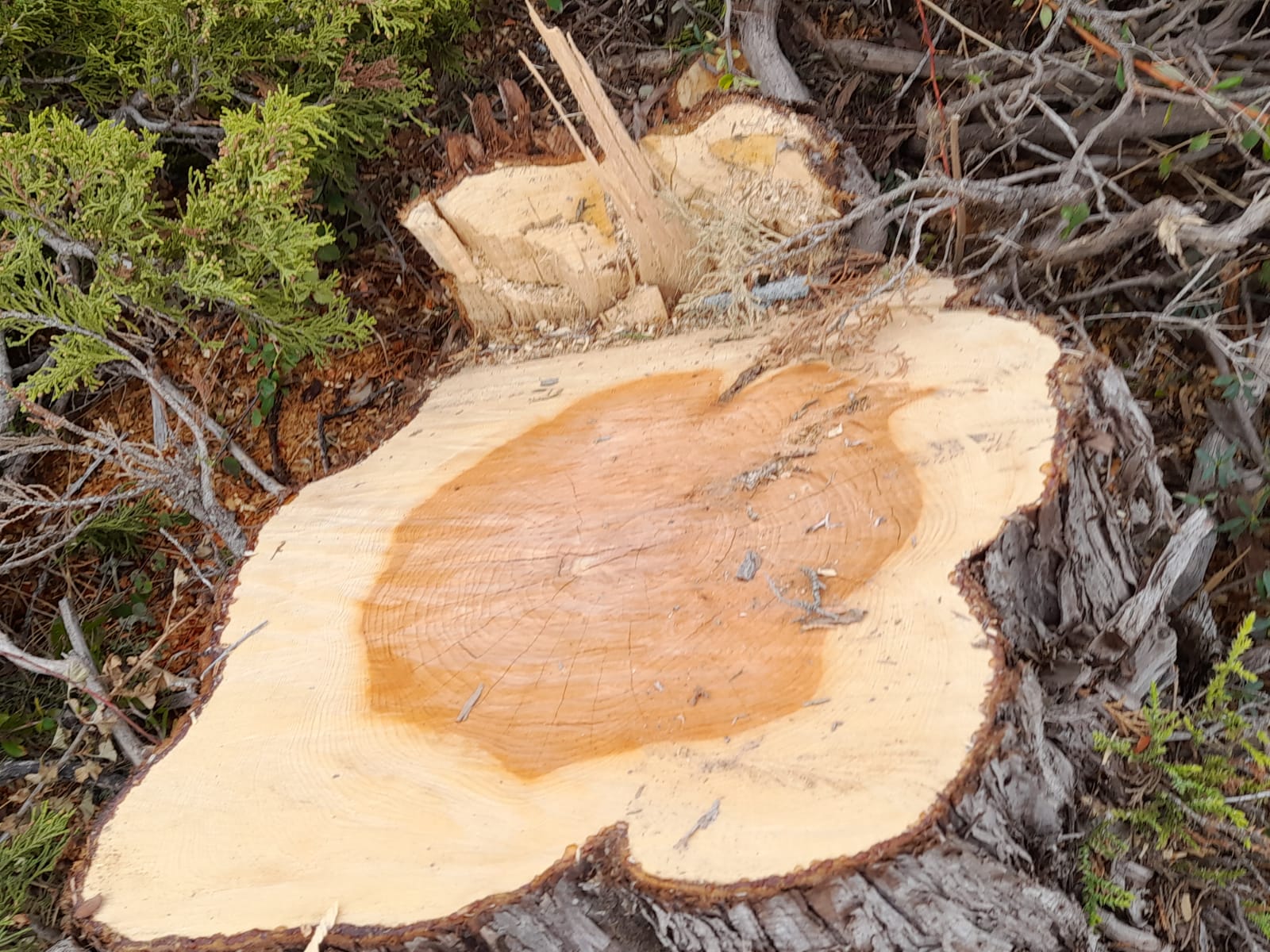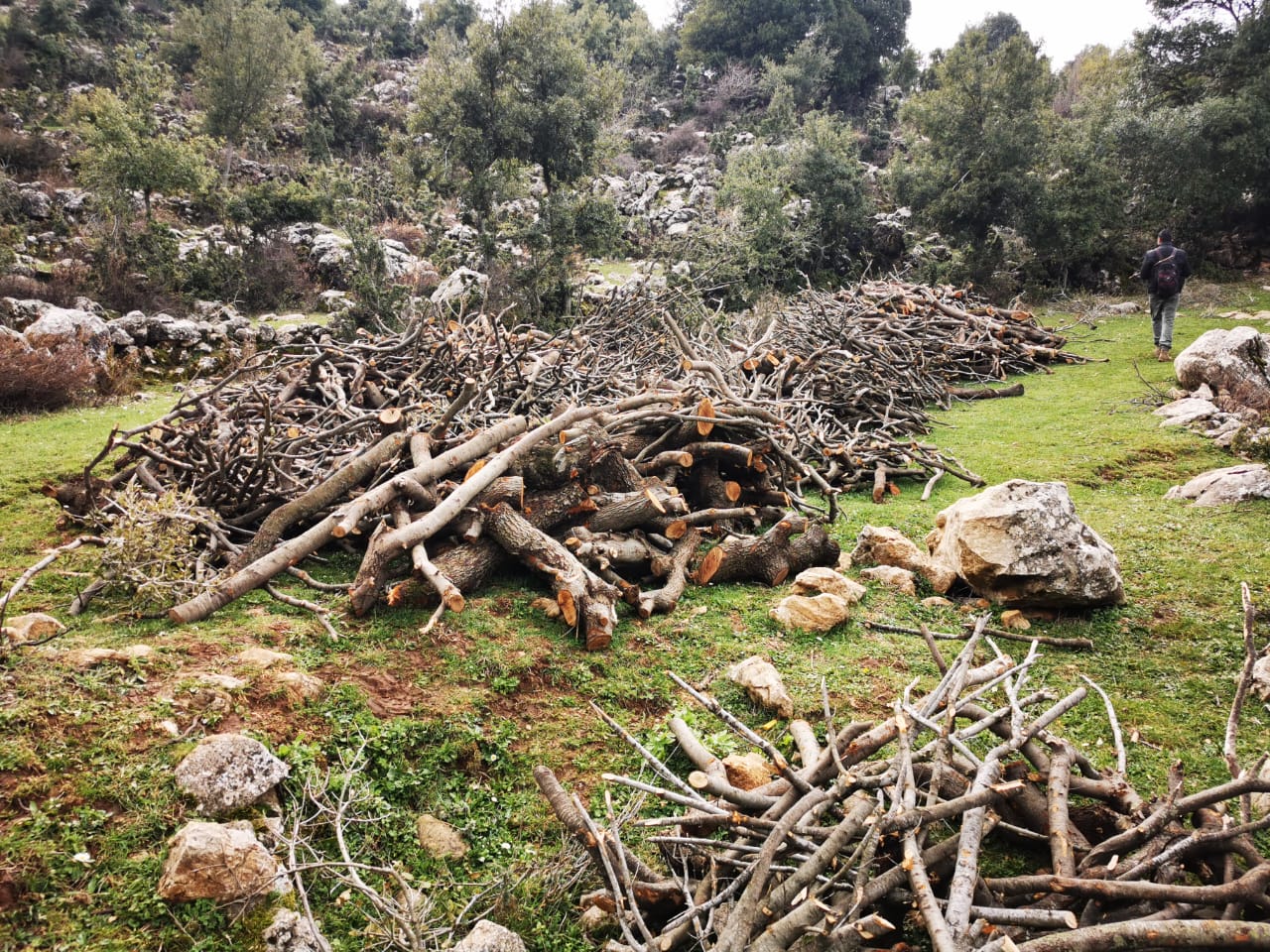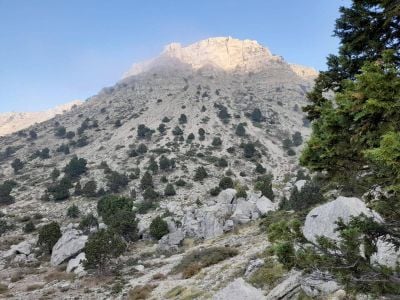There are more and more bare mountains in the heights of Akkar. (Credit: Photo sent by Hassan Zakaria)
Four environmental activists were attacked on Saturday in a forest while trekking between the villages of Bzibina and Tachee, two still very green localities in Akkar.
Mohammad Arabi, a rural development expert and member of the Lebanon Eco Movement (LEM), which regularly documents the increasing illegal felling of trees in the region, claimed that he and his fellow hikers were aggressively intimidated and stopped in their tracks by four men.
“These men had no right to approach us or detain us on the spot, and yet that’s what they did,” he told L’Orient-Le Jour.
It was only after several phone calls to local and national security and political authorities — including caretaker Environment Minister Nasser Yassin — and given the scale of the case, that the aggressors finally let the activists to move on.
Although the victims believe that the attack was premeditated and related to their work, none of the people L’Orient-Le Jour interviewed were able to identify exactly who the attackers were.
‘Akkar will soon be stripped of its forests’
But the incident, which was reported by the LEM in a detailed statement, is indicative of heightened tension in these localities at a time when rampant tree felling is taking place in one of the country’s most unspoiled regions, albeit one regularly affected by forest fires.
Several observers and elected representatives told L’Orient-Le Jour that the entire Jouma region, where the two villages are located, and the Qaytaa region, where the Qammouaa forests are found, are plagued by the scourge of felling.
Rony Hajj, the president of the union of municipalities of Jouma municipalities, and Abdulilah Zakaria, the president of the union of municipalities of Qaytaa, described the situation as “disastrous” and said they are powerless in the face of this “ecological massacre.”
“Several offenders are hitting between Akkar al-Atika, Bzibina, Beino, Tachee and Tikrit,” said Hajj, naming villages in his union. “And we’re not talking about poor people collecting firewood, but big timber merchants who are attacking oak and pine trees with electric saws, tractors and lorries,” he added.
Our correspondent in northern Lebanon, Michel Hallak, pointed to “lorries loaded with logs crisscrossing the roads of Akkar at all hours, transporting the wood all over Lebanon.”
 A tree stump in the Qammouaa area. (Credit: Photo sent by Hassan Zakaria)
A tree stump in the Qammouaa area. (Credit: Photo sent by Hassan Zakaria)
The same is true of Qammouaa, where Zakaria deplored the fact that “the local police are having all the trouble in the world dealing with these tree massacres by powerful traders.”
When asked about the illegal felling of trees, the respective mayors of Bzibina and Tachee, Tareq Khabazi and Nayef Moury, denied that such activities were taking place on their land and even shifted the blame to each other on the subject.
Hassan Zakaria, an activist and guide who lives right in the forest and sees the changes every day, confirmed the scale of the disaster. “Forests dense enough to hide planes have become sparse,” he told L’Orient-Le Jour.
“The worst thing is the loss of junipers, cedars and Cilician firs [species protected by law]. These trees are beyond repair and will no longer grow easily in the current environmental conditions,” he added.
Arabi is even more alarmist: “If this problem is not solved, Akkar will be completely stripped of its forests within two years!”
L’Orient-Le Jour reached out to both caretaker Environment Minister Nassar Yassin and caretaker Agriculture Minister Abbas Hajj Hassan for comment on the issue, but neither had responded at the time of publication.
 Piles of cut wood in Tachee in 2022. (Credit: Mohammad Arabi)
Piles of cut wood in Tachee in 2022. (Credit: Mohammad Arabi)
Impunity
How can we explain the impunity enjoyed by these traders, who are engaged in an illegal and devastating activity? Several sources in the region, who asked to remain anonymous, suggested that they benefit from an extended network of local political and administrative accomplices — without naming those concerned — in a context of institutional decay and, in particular, the high cost of gasoline, which makes movement in the area costly for security agents.
“We try to contact the security forces, but to no avail,” said Hajj. “Some offenders have already been brought before the public prosecutor, who almost always frees them, as felling trees is not considered a crime but rather a misdemeanor. We’re trying to put forward the argument that they’re stealing resources from other people’s land [whether it’s state land or land belonging to other private individuals] to get tougher sanctions imposed.”
For his part, Zakaria can only find salvation in the army, which did indeed intervene in Qammouaa on Wednesday to arrest offenders and seize felled wood from their depots. “We can only rely on the military; otherwise, it could turn into a confrontation,” he said.
“If they knew the true value of the trees, they would never have felled them like this,” said Zakaria, who warned of the longer-term consequences in terms of pollution and the health of local residents.
This article was originally published in French in L'Orient-Le Jour. Translation by Joelle El Khoury.
